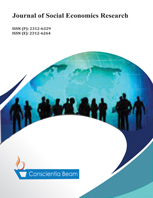Intention to participate in voluntary social insurance in an emerging economy: An examination based on extended theory of planned behavior
DOI:
https://doi.org/10.18488/35.v12i1.4087Abstract
The study aimed to assess factors influencing the intention to participate in voluntary social insurance among informal sector workers in Vietnam, an emerging economy in Southeast Asia. Primary data collected from 460 respondents was used for SEM analysis. The study showed that two parts of the Theory of Planned Behavior (TPB) model—attitude and perceived behavioral control—make people more likely to sign up for voluntary social insurance. Government incentive policies, appropriateness, affordability, and perceived difficulties during the COVID-19 pandemic also predict the intention to participate. The research findings rejected the role of subjective norms in influencing the intention to participate. This research has identified factors affecting intention to subscribe to voluntary insurance among independent laborers in an emerging market like Vietnam, where there used to be larger proportion of formal workers who had to follow mandatory social insurance. Based on the revealed impact factors, policymakers and labor-related authority officials may have insights into how to encourage more informal workers to purchase voluntary insurance. This is particularly critical in a context where the majority of the population, especially independent laborers, are not used to subscribing to insurance in general if not required.

